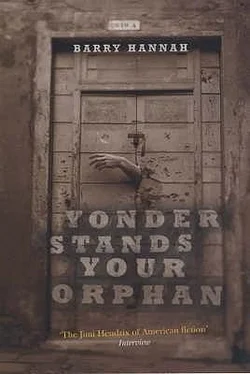Elka used to run in a circle of lower-Delta party girls who performed on crop dusters while they were flying and poisoning, just for the memory. Under the telephone wires, up quick. Then down for the gin and Costume Ball of the Scots in Panther Burn. Or dynamiting with bachelors in Robinsonville, making new homes in old levees and Indian mounds, where whole old guys might come out, and their pots.
Sidney Farté was in attendance to pick up his rumors. Many thought Bertha had killed herself because Sidney had been with her, and Sidney spread this rumor around as fact.
Frank Booth sat beside Ruthna, motionless. She had told him she knew Bertha and really loved her. Had once roomed with her at the Olympics in Atlanta. Booth was there for Ruthna, and to confront Man Mortimer with what he was now, a Conway Twitty face fresher than Mortimer’s own, unlined. Nobody knew what Booth had on his mind, although Edie, who always carried a North American.22 Magnum derringer, promised to blow his head off if he came near Mortimer in his feeble condition and new black ear. Especially with his parents visiting or maybe even come to live, and he was surviving by their ignorant ministrations as he brought them here and there to bits of his empire in the lower Delta and in Vicksburg. They were amazed the river was so wide, having never expended the energy to look at it directly in Missouri. They recalled only fearing it and now feared it more. They were eighty. They had retired in good financial condition, but it meant little to them with no son, no hobbies and the new small house. No chickens inside city limits anymore. They had been sad for thirty years and wondered how especially terrible they were that he had run away from them. They went to church often and desperately and watched Help Me on television, in case he called out or somebody found them .
Now they had found him, they dreamed separately that Man Mortimer was not a nice person, and they tried to force a good dream about him, but it would not come. Then they began to remember how selfish a child he had been. Yet their love loved this too. They recalled that he was vicious, calculating and secretive, and they could see right through his present act, yokels that they were, and parents, at this very funeral. His counterfeited sorrow for Bertha. Still they loved. It was too late not to love, and it did not matter anymore where they themselves were. It was having him close, that was what life was for in the end. It mattered not where they slept. They barely wrinkled the bedspreads in the Gold Bowl room he got for them, mermaids on the wallpaper. Mrs. Mortimer’s canaries thrived. The maid found the Mortimers so lost she took them on as a project. And they must help him, their son.
It was very intimate here, at the Church of Open Doors, open for the lost and dead of all causes. Raymond sat next to Mimi, his temples gray now and growing hair behind, as if to take up the ponytail Egan had shaved. He was disconsolate near the man who had stabbed him. He had tried to forgive him, but not very hard. He wished to be taken into a different room of heaven with Mortimer’s blood on his hands. He did not require whole salvation, just a little table with books and coffee, pens and paper, the saxophone. Now Mortimer was little and sick. The monster Lloyd was close to him. Raymond hid his murderous thoughts from Mimi, who had dressed up to hide her impatient body. Long dress, lapels. She had no allegiances here. She was weary of Raymond. Weary of the band. Of herself. Of the lake. Why were they still here?
Then she remembered. They had no money. Even nature palled when you had no money. Nature was without religion sometimes when you looked at it poor, and all the creatures seemed bedraggled and begging, hardly getting by. You saw a fat one and wondered. Where was she getting her orders? They had the church. Then there was other money coming, the CDs, but that had proved a more difficult game than Raymond thought. He would always find some money somewhere, she believed.
Mortimer seemed comfortable sitting by his parents, perhaps enjoying his slide to invalidism. Or coiling tighter. He did not know how to act at a funeral, so he looked tragic, but the effect was that of lurid grinning. Egan saw this and the face almost ruined his eulogy.
Which was that Bertha was quiet and unknown as in Gray’s “Elegy in a Country Churchyard” and that she hurt even in her prosperity like “Richard Corey,” the suicide who had it all, as others cursed their bad bread and envied him. Did God accept suicides? There was a case for His Own Son’s hesitant suicide on this earth. And so much cloudiness here as to shut up the meaner of us who wanted to keep souls out of heaven. Heaven was many houses, very big and wide. Many mansions, many houses, as the savior promised us, or He would not have told us so in His words. Many and large. “May heaven rest her soul in a home she can decorate at leisure,” Egan said. Some of the crowd laughed; most didn’t care but loved a good send-off where you met others who were horny from close death like you, among food and drink afterward. Four were simply dying for a smoke and had no opinion right now of God or the century just passed or Bertha. Bertha’s mother would weep later, with a Marlboro Light inhaled and going.
Max Raymond suddenly knew his vision would come at the end of his life and not a moment before. He was nearly blinded by the realization that he was a nuisance to both God and man. He repented. He would act. He felt expendable to a higher power and this was good. He was resigned but in no way sad. He thought of Bertha as she went now, and he prayed to her in that black paradise.
Elsewhere Ulrich watched Melanie’s greyhound. He couldn’t get over it. He loved the face of this gentle beast, hunched as if alarmed by its own aerodynamics, its eyes sliding away, seeking affection as if its whole soul were poised on ice and betrayal lurked beneath each footfall. Of course Ulrich wept, but not too much.
“Where do you live, son?” Mortimer’s mother asked. They were seated at a restaurant under the bluffs in Vicksburg. Beneath its foundation, it was said, were many who had received fire from Federal gunboats, who were losing to the rebel artillery very badly in 1863. Hundreds of bombs and cannonballs fired from the gunboats, many of them on fire or in other distress. Attack from the water was impossible, and even running the water was deathly. The river lit at night with all kinds of barrel flares and wrecks, perfect for gunners who could knock the heads off chickens at a mile. Lord God, war was fun for a while, till it crept up on you.
Now the riverbed’s mass grave held a high-beamed, wide-planked bar and grill, that served oysters, fish and pizzas, and fresh salads from gardens nearby, fine French bread twists. Mortimer liked the lassitude here in the ferns and shadowed glass, as if the dead boys dancing with death had built it just for him 135 years later in a flush Vicksburg, very paved and rolling. Thinking of those good boys and their wails really widened the head for thought.
Mortimer looked benevolently at his mother, but this look was another unnatural one for him and he wound up grinning like a coon. He didn’t like to be alone with them because they were getting heavier on him with questions, since they knew nothing beyond their county. They had no life except breathe the old air and sleep again. Mortimer thought, I don’t know anybody even nearly this old except the fools at the pier and Sidney, who was growing younger, curiously.
“I have several homes. The construction has been slowed by the rains.”
“Why do you lie, son? It ain’t rained,” said his father. “We don’t care if you live in a palace or a doghouse.”
“It has rained where they are. They’re in other counties, spread out. I haven’t got them ready for guest occupation. Can’t you wait? The Gold Bowl too racy for you? You’re afraid of gamblers and performers getting under the door?”
Читать дальше











